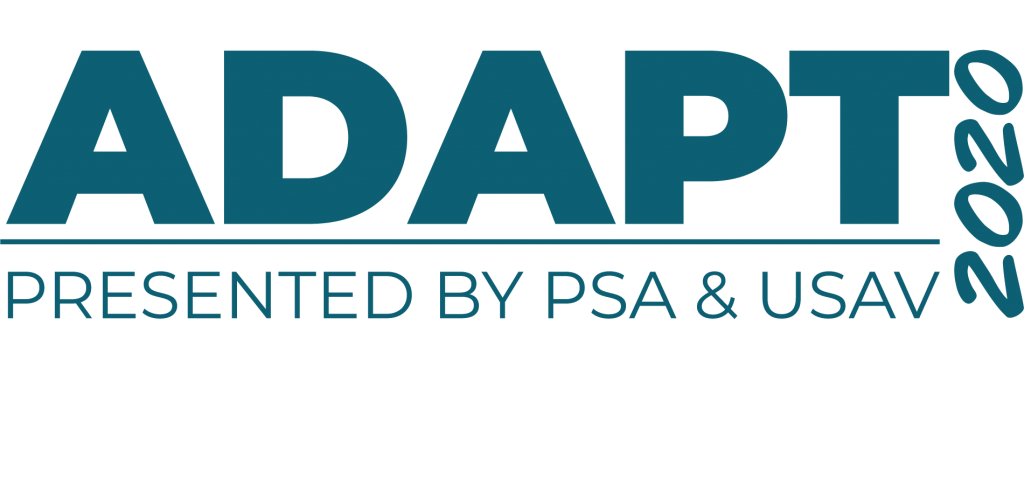Integrators Learn How to Navigate the New State of the Industry at PSA Adapt 2020

PSA Adapt 2020 — PSA’s version of the online industry conference — took place Oct. 6-8, providing three days of leadership-driven education for 340 PSA and USAV members and partners.
Intentionally designed to help members adapt to challenges in the industry, including embracing new models and mindsets, organizers wanted attendees to have an opportunity to learn about new trends, network with other industry members and vendors and gain access to additional tools and resources.
The event kicked off on Tuesday, Oct. 6, with a general session on the state of the industry, featuring PSA CEO Bill Bozeman, PSA President Ric McCullough, Egis Capital Partners Managing Partner Bill Polk, Security Specialists President and CEO Dan Budinoff and National Systems Contractors Association Executive Director Chuck Wilson. The session explored what is currently happening in the marketplace, and the challenges and opportunities that security professionals are facing.
“I’m pleased to say things are going better than anticipated,” Bozeman said when asked about the health of the industry. “We created several different scenarios, and our small- and mid-sized integrators are doing better than anticipated. They have been able to adapt, they are disciplined; our integrators have been great.”
Still, though, Bozeman made it clear that the state of the industry isn’t perfect (it never is). Some integrators — in particular, the ones that put all of their eggs in one basket by serving only one vertical market — are struggling.
“Being able to adapt is off the charts important,” Bozeman said. “For our integrators that can’t adapt, they will have big problems.”
Chuck Wilson said the larger companies are the ones experiencing the greatest decline in revenue, partially because they were not eligible for PPP funding that could have offset some of the negative effects of the coronavirus pandemic on business.
He added that this may have actually led to the larger companies adapting quicker. What he was really worried about was the mid-sized companies, and whether they would be able to pivot quickly enough.
“Surprisingly, we have seen they are successful and able to make payroll and get through this,” Wilson said. “We are predicting that by year end we will see a 20 percent decline [in revenue] from our integrators if you lump them together.”
Not being able to conduct project meetings, safety issues and scheduling problems have all contributed to this decline.
Bill Polk said that, when looking at different subsectors of the industry, the alarm sector is doing well, as RMR streams have held up though installations are down. The residential sector, he added, has a number of large, highly leveraged companies that are experiencing financial difficulties unrelated to COVID-19, but they are compounding. Access control is becoming increasingly critical where systems are securing the enterprise in order to manage employee wellness.
Polk also pointed out the increasing importance of cybersecurity in the industry.
“There has been a massive shift in cloud deployments due to work-from-home activity and the expanded number of attacks,” Polk said. “What we’re seeing here is that devices must be protected — not only to protect assets and people, but to meet this exploding number of requirements being driven by cyber.”
Everyone seemed to agree that those integrators without RMR have suffered more through the ups and downs of the pandemic. Bozeman and the rest of PSA has been encouraging members to add more RMR offerings for years.
“We never recommend that any of our integrators abandon their core business model — that would be absurd,” Bozeman said. “What we recommend is that they gradually adopt an RMR model so they can be more desirable for their bank, etc. And this isn’t so much COVID-19-related, but the work we’ve done over the last five years.”
As of right now, Bozeman said PSA has about 200 members, and he considers approximately 40 percent to be onboard with the RMR model. Another 20 percent or so are becoming interested — they attend the meetings, and they look at the products needed to enter the space.
“One hundred percent of PSA integrators understand [managed services] are here to stay,” Bozeman said. “Forty percent are active, but that leaves a pretty big percentage (60 percent) that aren’t preparing themselves for the future with managed services.”
Polk said the biggest threat to integrators right now is not understanding and adapting to how the ecosystem is changing.
The day continued with a variety of educational sessions on leadership, sales, operations, managed services and more. Throughout the week, attendees could also attend the virtual trade show to see new product offerings and connect with sponsors; if anyone wanted to network, they could connect with colleagues in a variety of discussion groups, or by requesting a private meeting with an attendee or sponsor.
Wednesday, Oct. 7, started with a general session on the state of the integrator, featuring Bozeman again, along with Bridges System Integration Partner Brent Berger; Ollivier Corporation President and CEO Louis Boulgarides; Tech Systems President Wayne Smith; and ECD Systems President and CEO Mike Bradley.
Touching on a lot of the same points as the general session the day before, this session focused solely on the security systems integrator and their specific pain points, with the integrators on the panel sharing their own experiences.
Again, the importance of the diversification of offerings, managed services and the ability to adapt were a main focus.
“You do have to have a commitment to [managed services],” said Wayne Smith. “Every year we look at our budget and figure out how to grow that revenue; and it’s from the top down — a part of what we do every single day. You can diversify, provide as-a-service for almost anything you want, and just build on it, because it certainly helps to smooth the waters during times like these. It’s a part of who we are, and a part of our DNA.”
An educational session later on Wednesday, “Pardon the Disruption: New Companies and Technologies Disrupting the Market,” featured PSA Vice President of Sales and Vendor Management Tim Brooks; Tech Systems President Wayne Smith; Matterhorn Consulting Principal Paul Boucherle; LINX Multimedia President Travis Deatherage; and Red Thread CTO/VP of Audio Visuals John Mitton.
In the session, attendees learned that 82 percent of employers plan to continue allowing some remote working; 37 percent of the workforce can plausibly do some of their work remotely; and 25-30 percent of the workforce will have permanently adopted working remotely multiple days a week by the end of 2021 — all pointing to a serious disruption in the commercial office market.
“Our job is to get ahead of this curve and become a trusted advisor to our clients,” Deatherage said.
The panelists also discussed multiple new customer trends, including the focus on safety and health, and the adoption of new technologies such as contact tracing, temperature detection and touchless access.
“I believe out of this pandemic there will be a lot of opportunities,” Smith said. “If you’re really smart and innovative, you can take advantage of those opportunities.”
The conference ended on Wednesday morning with a final general session, “Today’s Economic Outlook — Making Informed Business Decisions.” Here, Armada Corporate Intelligence Managing Director Chris Kuehl gave a very current assessment of the U.S. and global economies, and a forward looking analysis of trends to watch.
All PSA Adapt sessions will be available to view on demand at members’ convenience through August 2021, and you can still register through Oct. 31 at www.psaadapt.com.
Looking for a reprint of this article?
From high-res PDFs to custom plaques, order your copy today!






